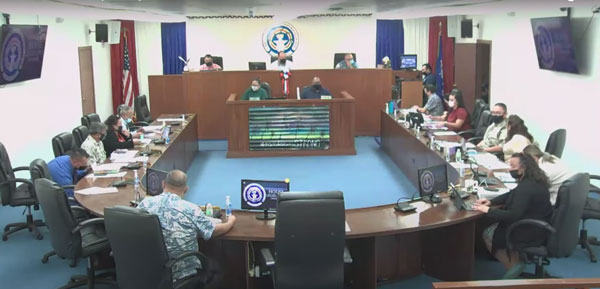House rejects Senate proposal on retirees’ bonuses

The CNMI House of Representatives unanimously rejected Tuesday a Senate proposal that sought to grant Gov. Ralph Deleon Guerrero Torres 100% reprogramming authority as a condition to fund bonuses for CNMI retirees.
House Bill 22-91, HD1, SS1 failed by a vote of 20-0, and will go into conference.
House Speaker Edmund Villagomez appointed House Ways and Means chair Rep. Donald Manglona (Ind-Rota), committee vice chair Corina Magofna (D-Saipan) and vice speaker Blas Jonathan Attao (Ind-Saipan) as conferees for the House. The House Ways and Means committee stands ready to preside over the matter once Senate President Jude U. Hofschneider appoints his respective conferees.
Manglona pre-filed bipartisan H.B. 22-95, which allocates the initial $1.3 million identified in H.B. 22-91 from provisions that were originally passed by both the House of Representatives and the Senate but line-item vetoed by the governor. The updated bonus includes an additional $1.3 million reappropriated from the governor’s discretionary account, the Office of the Governor and the Department of Finance to effectively double the previously proposed bonus for CNMI retirees, with $2.6 million specifically identified local funds.
CNMI retirees were initially promised bonus payments from the Executive Branch when Gov. Ralph DLG Torres announced his plan for a Christmas Bonus in a December 2021 media briefing.
The Planning and Budgeting Act, Title 1, section 7402 of the Commonwealth Code provides the governor 25% reprogramming authority. Manglona said that even with the doubled bonus proposal, the $2.6 million identified in HB 22- 95 falls well within the scope of the governor’s reprogramming powers.
A week ago, Finance Secretary David Atalig confirmed the governor could have allocated the $500 retirement bonus through his reprogramming authority back in December if he approached the Legislature to establish a business unit. Atalig also confirmed the governor could have approved the $1,000 bonus because he had $2.6 million in reprogrammable funds available to him.
“Rather than give the bonuses, Gov. Torres instead decided to manipulate our counterparts in the Senate and chose to use our retirees as pawns in a cheap political stunt to regain 100% reprogramming authority,” Manglona said. “He can blame the House leadership as much as he likes but we identified the specific business units and specific dollar amounts to fund the bonus for our retirees, not once but twice.”
In January, the CNMI Senate delayed the bonus payments when they amended H.B. 22-91 to double the proposed bonus without the proper identification of a specific funding source. The Senate version also granted Torres 100% reprogramming authority from his current legally authorized limit of 25%.
“When our counterparts in the Senate proposed that we double the bonus, they once again failed to identify the source of the funds in a veiled attempt to grant the governor 100% reprogramming authority of the limited resources in our general fund,” Manglona said. “H.B. 22-95 provides our community the transparency mandated in the previous election by clearly identifying the specific business units and specific dollar amounts that will fund the bonuses.”
Governor, Senate yet to act on new round of CNMI economic impact payments
In January, the House unanimously passed House Joint Resolution 22-12 to strongly encourage and endorse the issuance of a new local stimulus payment of $500 per resident and $500 per dependent. (PR)
Introduced by House Health and Welfare chair Rep. Christina Sablan (D-Saipan), the bipartisan joint resolution followed eligibility guidelines from the previous federal stimulus packages for households that met adjusted gross income guidelines of up to $75,000 per individual or $150,000 for married couples.
The Senate has yet to act on H.J.R. 22-12. Sablan says CNMI residents could receive a new round of local stimulus payments immediately, as the proposed funding falls within Torres’ expenditure authority with funds received under the American Rescue Plan Act.
“The governor knows this is an allowable use of the ARPA funds. He should prioritize the new local stimulus to help residents who really need it, instead of prioritizing paying $500 to tourists,” she said.
H.J.R. 22-12 also strongly urges the economic impact payments to be made directly to qualified households instead of limiting spending options to local vendors that accepted Visa debit cards, as with the previous local stimulus distribution. (PR)






